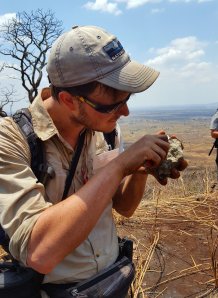
Rising stars of academia have been awarded fellowships from the Natural Environment Research Council (NERC)
Boost for green research at Exeter
Sustainable seafood and electric cars are among the eco-friendly industries that will be the focus of new research at the University of Exeter.
Four rising stars of academia have been awarded fellowships from the Natural Environment Research Council (NERC), meaning their research will be funded for three and a half years.
The fellowships include two for researchers working on the major health risk posed by antibiotic resistance.
The four Industrial Innovation Fellowships – the most given to any university – include three for researchers at the university’s Penryn Campus in Cornwall.
Dr Sam Broom-Fendley, of Camborne School of Mines, is researching “rare earth elements” which are used in high-strength permanent magnets – essential for technology including electric cars and wind turbines.
“Demand for these technologies is expected to grow substantially to meet clean energy targets and reduce CO2 emissions,” Dr Broom-Fendley said.
“Demand for rare earth magnets will also follow this upward trend, but there are issues relating to supply of rare earth ore.
“Rare earth elements are divided into ‘light’ and ‘heavy’ elements, both of which are needed for these magnets,
“At the moment we’re not mining enough heavy rare earths, so during my research I will explore for new deposits and new ways to extract more of these.”
The NERC fellowships are funded to address areas relevant to the UK Industrial Strategy.
Another Exeter researcher to receive a fellowship is Dr Robert Ellis, whose project – “Flexing your mussels” – is about improving aquaculture (seafood farming).
Dr Ellis said current production of seafood will need to double by 2050 to keep up with increasing demand.
“What’s more, mussels and oysters, which feed on algae in the water, are very vulnerable to climate change. This makes achieving this challenge far harder,” he said.
“Farming shellfish, such as mussels, is the most eco-friendly type of aquaculture, offering the best chance to sustainably increase production worldwide, but climate change really threatens this. During my fellowship I am looking to ‘futureproof’ these food sources.
“In other areas of farming, selective breeding has been used to promote fast growth or climate change tolerance, but within aquaculture this hasn’t happened as the industry is still very young. My project aims to look at this technique in mussels.
“I will be looking at different populations of mussels and seeing which are more resilient to effects of climate change such as rising temperature, higher CO2 and changes in salinity (amount of salt) in the water.
“The goal is to look at 50,000 genetic markers and create a tool which will help farmers understand their stock, help with seafood traceability and ultimately choose individuals to breed from.”
The other Exeter researchers given fellowships are Dr Anne Leonard and Dr Aimee Murray, who are studying antibiotic resistance – widely recognised as one of the greatest health challenges of our time.
Date: 8 December 2017
